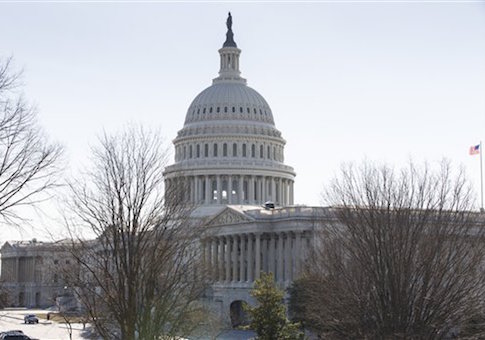A Senate committee on Thursday approved a resolution that critics described as an "unprecedented" move granting immigrants easier access to the United States.
The amendment, offered by Sen. Patrick Leahy (D., Vt.) and first reported on by the Washington Free Beacon, affirms the Senate’s belief "that the United States must not bar individuals from entering into the United States based on their religion, as such action would be contrary to the fundamental principles on which this Nation was founded."
The language was offered in response to recent comments from a presidential candidate who called on Muslims to be barred from immigrating to the United States.
Critics of the resolution's language claim it could hinder attempts by U.S. law enforcement agencies to examine an individual’s religious beliefs as part of a background check on new immigrants.
A bipartisan 16-4 majority on the Senate Judiciary Committee voted in favor of the resolution. However, Sen. Jeff Sessions (R., Ala.) criticized the measure and offered his own counter proposal.
The immigration language "would constitute a transformation about our thoughts on immigration" and be interpreted as "a move towards the ratification of the idea that global migration is a human right and civil right for those in the U.S. and that immigrant rights must be supreme" to those of current American citizens, Sessions said.
"Foreign nationals living in foreign countries do not have a constitutional right to enter the country," Sessions said before offering an additional amendment to uphold Second Amendment rights to bear arms.
In what appears to be a direct shot at Leahy’s immigration language, Sessions’ amendment expresses the "sense of the Senate that the individual right of the American people to keep and bear arm" is among the "fundamental rights necessary to our system of ordered liberty and deeply rooted in this Nation’s history and tradition."
"Any violation of this precious right would be contrary to the fundamental principles upon which this nation was founded," the amendment states.
Leahy defended the amendment as a simple, commonsense measure reiterating America's commitment to welcoming immigrants from all faiths and ethnic backgrounds.
It is "simply a sense of the Senate, it expresses the sense of the senate that the U.S. must not bar individuals entering into the U.S. based on their religion, as such action would be contrary to the fund principles on which this nation was founded," Leahy told the committee."I know many on this committee, on both sides of the aisle, have rightfully expressed outrage about the call earlier this week to shut our border to Muslims."
Approval of the amendment would "send a clear and direct message that America welcomes all people from all countries and faiths," he said.
Sessions said that the Senate is heading down a slippery slope by backing language that seeks to eliminate religion as a factor considered during the immigration process.
"Reality would be denied if we do not realize that damaging religions and sects have arisen" across the globe, he said, describing the measure as "reckless."
One congressional source who spoke to the Free Beacon Wednesday evening about Leahy’s language described it as a dangerous proposal.
"The Constitution, by definition, is a document that protects the rights of the American people—to extend it to the citizens of foreign countries living in those foreign countries is to turn the Constitution from a document that protects Americans into one that renders them utterly defenseless," the source said.
"Congress can decide who to admit, and who not to admit, and on what grounds—our founding documents confer on no alien the right of entry to the United States and to travel down this road is to challenge the very idea that immigration is supposed to serve the American interest and no other."
Sessions was joined by Sens. Thom Tillis (R., N.C.), David Vitter (R., La.), and Ted Cruz (R., Texas) in voting no on the resolution.
